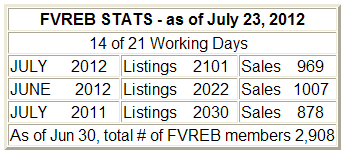Posted on
July 16, 2012
by
David Meyer

REW.ca
How much is your home worth?
The only real value is what a buyer and a seller shake hands on. But if you're selling or buying a home -- or paying taxes on one -- you need a realistic dollar figure to work from.
And that is going to depend on whom you ask. Your home has different value to different people and institutions, and many percentage points can separate the assessed value from the price your home actually fetches on the market. (Isn't that why you immediately suspect something's very wrong with a house that's being offered at below assessed value?)
Here's a top-to-bottom look at who determines house prices and what they're thinking.
$$$$
Realtor: A Realtor's job is to get top dollar for a home, so you're likely to hear the highest valuation from this real estate professional. Realtors have access to MLS® statistics that aren't available to the public: they know how long homes are taking to sell in your neighbourhood and how sold prices compare to asking prices. They're also out there all the time, looking at properties, meeting the people at open houses and talking to other Realtors. With all that information, they'll arrive at the highest price they think they'll be able to get, considering comparable properties in your area and current market conditions.
$$$
You: You love this place. You've got it fixed up the way you like it, and every inch of it has a memory attached. You've been doing your homework, reading Real Estate Weekly and checking out the listings on REW.ca and you have a price in mind that reflects not only what you think you can get, but also what you want to get in order to move to your next home.
$$
The Bank: Lenders do not want an exaggerated value attached to a home because they might end up wearing it. They want a conservative valuation so if the people who buy your home fail to pay their mortgage, the lenders will be able to get their money back. When an offer is accepted, in most cases the lenders send out an appraiser to look at the home and determine if it's worth what the buyer and seller have agreed on. If the appraiser thinks it's worth considerably less, the buyer has to look for other supporting financing, or the financing can fall through altogether. It can be hugely inconvenient if you're the seller, and devastating if you're the buyer.
$
BC Assessment: Here's the starting point. The most conservative valuation of your home comes from this self-supporting Crown Corporation. BC Assessment is in charge of attaching a dollar value to all of the 2 million properties in private hands throughout BC. It does this so that each municipality and taxing authority can collect property taxes based on a provincewide assessment standard.
This doesn't mean that someone from BC Assessment will visit your home every year. While it has appraisers, it doesn't have nearly enough for that. BC Assessment has a vast data bank which includes information from municipalities, the provincial government, the real estate boards and others.
Your property assessment is set on July 1 of the previous year and based on dozens of factors including:
- finished area
- age
- lot size
- number of bedrooms and bathrooms
- condition and quality
- layout
- sundecks and patios
- outbuildings like sheds and garages
- views
- traffic and noise
- schools
- neighbourhood amenities
BC Assessment analyzes home sales in bulk to establish market value for properties with similar attributes in similar neighbourhoods. Basically, it looks at the same things you do when you're house hunting: "Well this one's nice inside but it's too close to all that traffic on Main Boulevard. The other one's a bit smaller, but it's on a quieter street and it's got a finished basement."
Most assessments go up because of changes in the overall real estate market. If your neighbourhood suddenly became hot last year and homes were selling for far more than they did the year before, you'll see it in your assessment this year.
When there are extreme market changes, the government has even stepped in to cap the assessment. It did so in 2009 when prices in some places fell by over $100,000 from 2008 highs.
Your assessment could also go up because of something you did, e.g., took out a building permit for an addition or substantial updating. By changing the size or the effective age of your house, you've made it more valuable.
So What Is My Home Worth?
You can see how your assessment compares to that of other similar homes using BC Assessment's e-valueBC tool. Keep in mind, though that the values shown are for July of last year.
You can talk to a Realtor, or several. They know the local market inside out. Realtors often have their own methods for determining the market value of a home, and you could get several answers, all within the same ballpark. What the home actually lists for could be different again, depending on the Realtor's selling strategy. For instance, in a seller's market the list price could be lower than those of comparable homes, in hopes of inciting a bidding war.
If you want a detailed, current valuation, you can access the same data that lenders and real estate professionals use. Landcor Data Corporation's Property Valuator report costs $29.95, and along with a current market value, you get a history of the property, assessment data, neighbourhood market trends and much more. Landcor uses the BC Assessment database and other sources and analyzes the mountain of data using its own proprietary methods.
Ask your neighbours, friends and relatives. What the heck? This is the Lower Mainland real estate market. Apart from the weather, house prices are practically all we talk about, right? Can't hurt to see which way the wind is blowing.
Read the original article here





